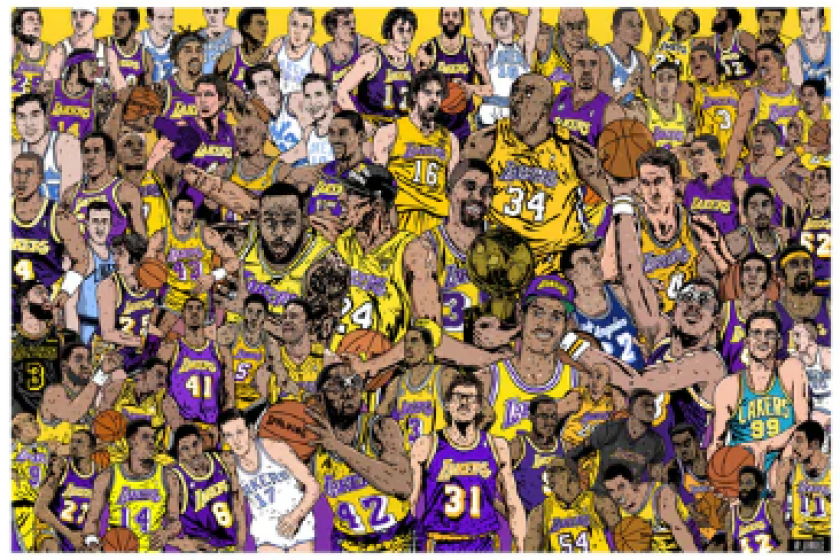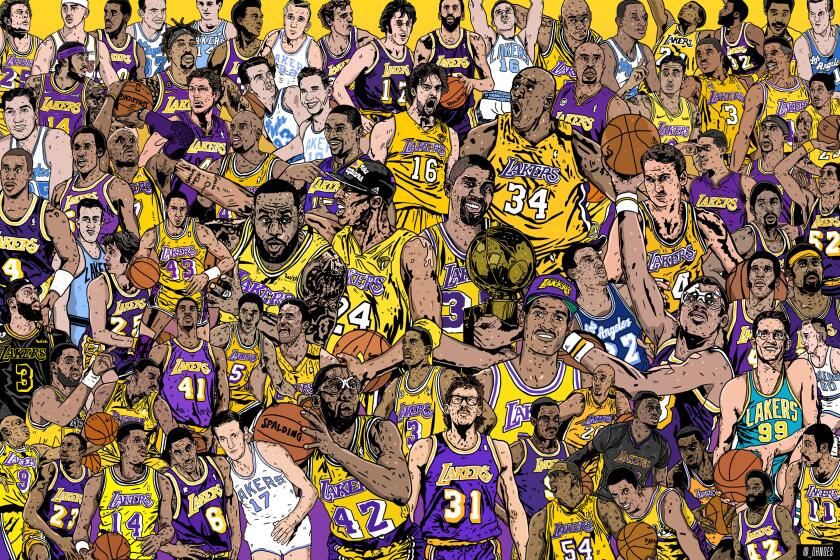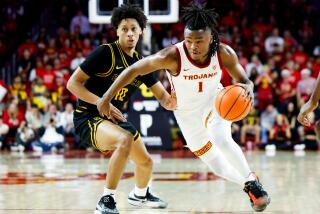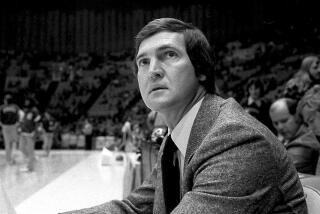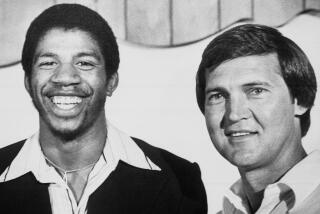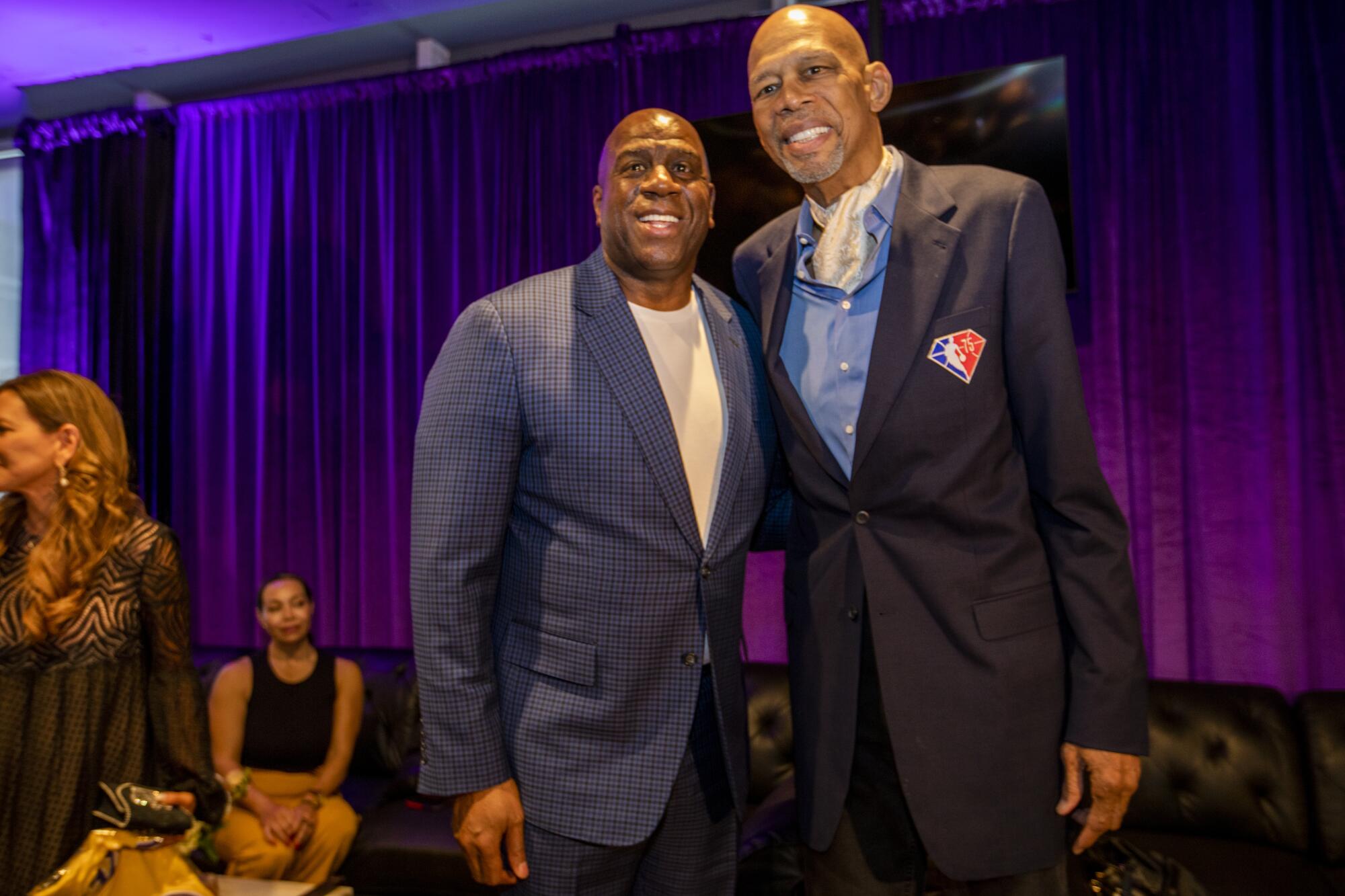
- Share via
When the Los Angeles Times decided to select the 75 greatest players in Lakers history to celebrate the franchise’s diamond jubilee season, we turned to our current NBA crew, which includes reporter Broderick Turner and editor Dan Loumena; former staff members in columnists J.A. Adande and Mark Heisler and reporter Steve Springer; plus reporter Dan Woike, who grew up a Chicago Bulls fan in the 1990s (but we won’t hold that against him).
Here are their thoughts on the voting process.
Why did you select Magic Johnson the No. 1 Lakers player?
Steve Springer: I thought there were three players — Magic, Kobe and Kareem Abdul-Jabbar — worthy of the No. 1 spot. All three had the stats, the longevity and the rings necessary to separate themselves from all the rest. Each won five titles (remember, only a player’s accomplishments while wearing purple and gold count). Kobe has the most points in Laker history with Kareem third. Kareem was second and Kobe third in rebounds. Magic was first and Kobe second in assists.
So why would Magic, lower in both points and rebounds along with total number of games played (sixth), be rated No. 1 overall? Because he leads in intangibles. Magic wasn’t only about numbers. For someone who didn’t see him play, there’s no way to explain him. But here’s some numbers that might help. In the five seasons before Magic arrived, the Lakers made the playoffs three times and reached the conference finals once, losing there to Portland in a 4-0 sweep. In the 10 seasons after Magic’s arrival, the Lakers reached the NBA Finals eight times and won five championships.
From the age of 19 when he first arrived, he was the heart and soul of those teams, making everybody around him better, keeping up their spirits in bad times, inspiring them in good times.
When Kareem was knocked out of the 1980 NBA Finals because of a badly sprained ankle in Game 5, Magic just shrugged, told his teammates, “Have no fear, E.J. is here,” and went on to lead his club to a championship-clinching victory in Game 6 with 42 points, 15 rebounds, seven assists and 48 minutes worth of nonstop high-fives.
He was No. 1 because, if you boil down everything he accomplished on the court into one word, that word has to be “magic.”
Who is the greatest Laker? As the franchise marks its 75th season, the Los Angeles Times staff ranked the top 75 Lakers. See the list and more in the November 14, 2022 issue of the Los Angeles Times.
J.A. Adande: Magic Johnson’s arrival in 1979 is what transformed the Lakers into The Lakers, the NBA’s most glamorous and most successful team in the 1980s. When subsequent greats such as Kobe Bryant and LeBron James spoke with admiration about the Lakers’ glorious tradition, do you think they were referencing the Minneapolis days or all of those Finals losses to the Celtics in the 1960s? No, they were thinking about Showtime, which meant they were thinking about the days when Magic wore No. 32.
Broderick Turner: Magic essentially built the championship table for the Lakers, winning five titles out of the eight times he went to the NBA Finals. He revolutionized the game as a 6-foot-9 point guard who was selfless and was team-first over anything else. He was the main reason why L.A. became the Showtime Lakers and must-see TV. He made the game fun and enjoyable. And his performance as a rookie in Game 6 of the 1980 NBA Finals against the 76ers remains epic in NBA lore. So, with Magic at the beginning of this love affair with the Lakers, he deserves to be No. 1 in my view.
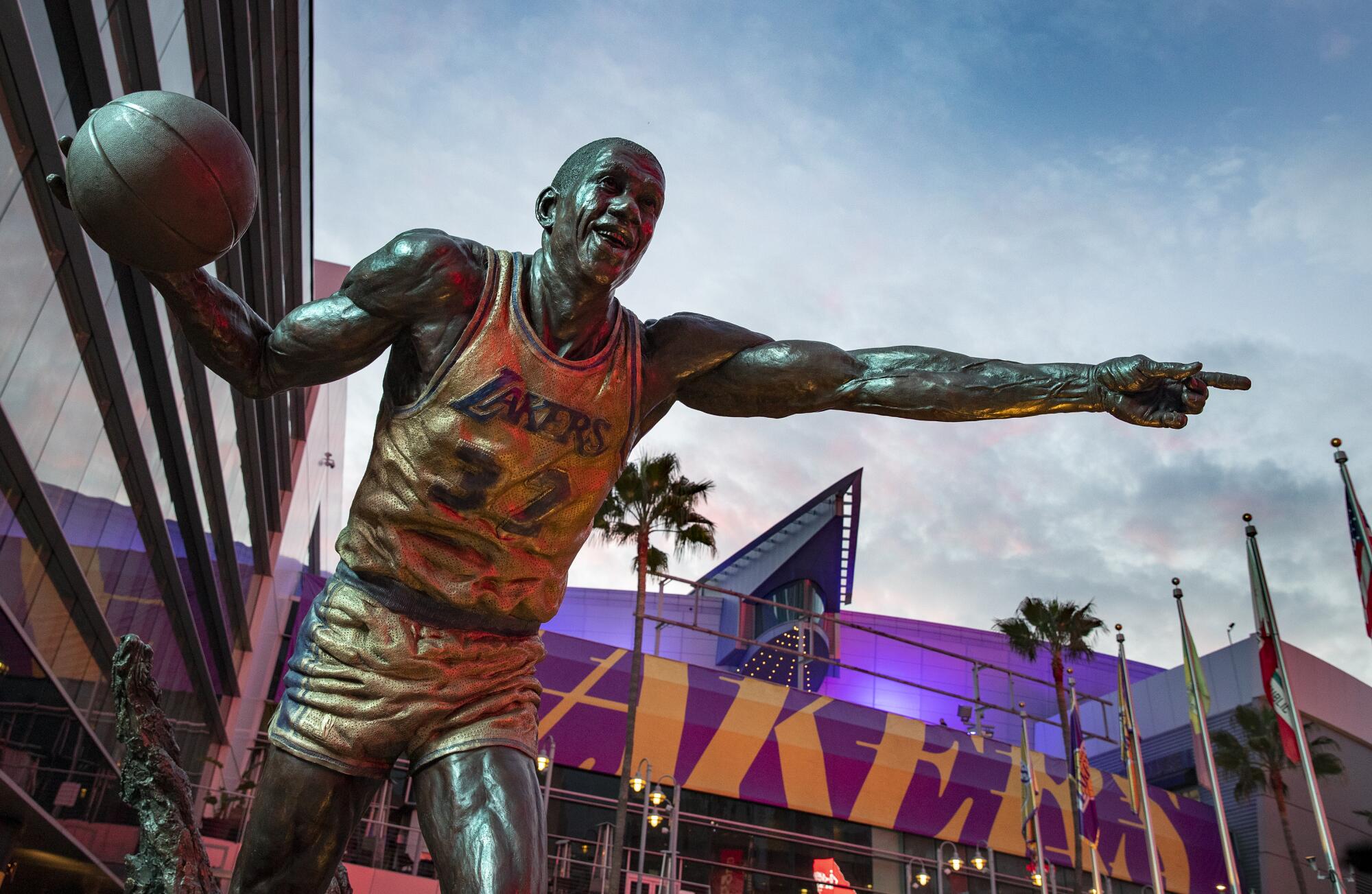
Dan Woike: To me, Magic Johnson is the Lakers — at least in the modern sense. He’s the man who meshed celebrity culture with basketball, the guy on the court finally more famous than the Hollywood folks sitting courtside. He’s an all-time winner, a revolutionary player and an international ambassador for basketball at its most entertaining — fast, open, creative and free. There are arguments to be made for five people for No. 1, and Magic just checks the most boxes.
When you put together your list, what surprised you most?
Dan Loumena: Slater Martin surprised me. I knew was a lead guard for some of the Minneapolis championship teams. He was also All-NBA five seasons in a row and a seven-time All-Star, including with the St. Louis Hawks later in his career.
SS: I certainly knew that Elgin Baylor was a phenomenal player who was Dr. J before Dr. J and MJ before MJ in terms of playing above the rim. Baylor was equally brilliant as a scorer and rebounder. But I didn’t realize that, at 6-foot-5, he had more career rebounds than 7-foot-2 Kareem despite playing 247 fewer games in purple and gold. Baylor is the all-time leading Lakers rebounder with 11,463, followed by Kareem with 10,279. Baylor also averaged more rebounds than Shaquille O’Neal, 13.5 to 11.9.
DW: Anthony Davis has the talent to be top 7, but health (and probably a negative recency bias) will keep him from it. The numbers are just silly, and when you add in his sublime defense, it’s hard to look at the individuals ahead of him and believe they’re truly better. When it comes to talent and production as a Laker, it’s almost unthinkable that he’s not in the top 10. But yet, it doesn’t feel quite right.
After slotting the Hall of Famers, or in Pau Gasol’s case a future Hall of Famer, did you find it difficult to rank the Lakers from 25th to 75th?
SS: Things fell into place pretty smoothly for me for the first 50. Not so for the last 25. It probably took me twice as much time and a lot of agonizing to complete the last group. In the end, I wound up with 34 additional players I had considered but ultimately couldn’t include.
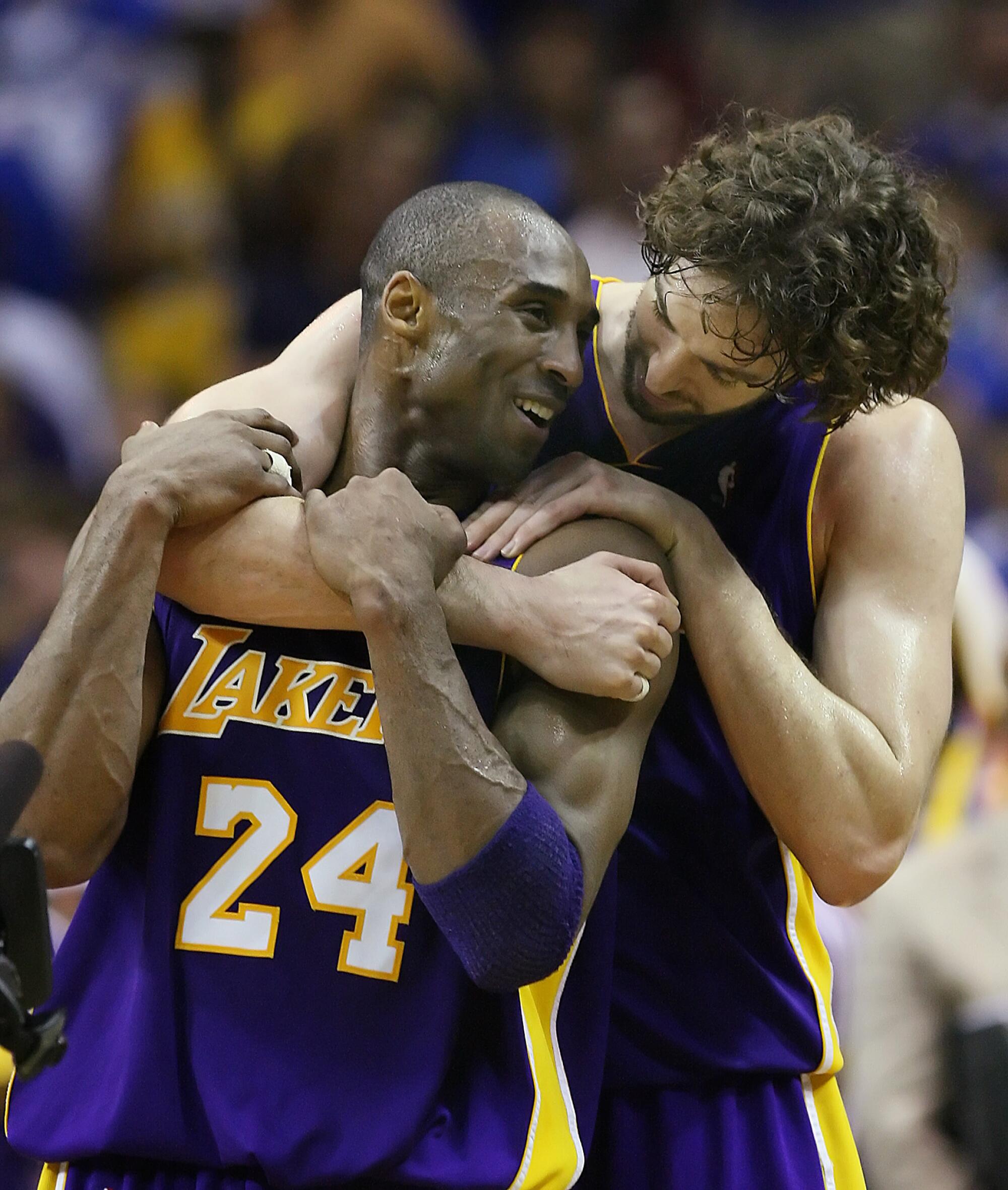
JA: It didn’t get difficult to me until I got into the mid-30s, once I got past not only the Hall of Famers but the strong contributors to multiple Laker championship teams. There’s a place for those who excelled during some of the franchise’s down stretches, but it can get hard to differentiate between those guys.
BT: Yeah, it was difficult, because the Lakers had so many great role players and they were great at acquiring former stars late in their careers.
DW: How do you compare the third-best player on a bad Lakers team and the 10th best on a legendary one? To me, that was the biggest challenge and you start dealing with it as soon as you get out of the top 20.
DL: I kept agonizing over the last 25, as in who was I missing? The middle 25, you’re looking at role players on great teams and star players on non-contenders, and that’s difficult to assess sometimes.
What were more important factors? All-NBA selections? Most titles? Dominating play?
SS: I didn’t consider All-NBA selections or MVP awards or anything else that was subjective. I considered four categories: titles, stats, longevity and unique qualities like leadership, being a clutch player, being an asset at both ends of the floor and being a uniter in the locker room.
JA: It’s the Lakers, which means championships have to matter above all. That’s why I had Shaquille O’Neal ahead of Elgin Baylor, even though Baylor scored over 9,000 more points than Shaq in a Laker uniform. Shaq wins the head-to-head ring count 3-0. On the other hand, it is a tribute to Baylor’s greatness that he’s the only player in my top 20 who didn’t win a championship.
BT: It was all of that, to be honest. Elgin Baylor is one of the NBA’s all-time greats, but unfortunately never won a championship. For the most part, if you made All-NBA for the Lakers it usually meant you won at least one championship, but not in Elgin’s case.
DW: If you won a title, you get a boost. Simple for me.
Anything else you want to add to the conversation?
SS: I’ll just say it was harder than I thought, but a lot of fun and a great opportunity to put all I’ve seen since 1979 into perspective.
DW: If we included off-court contribution, I think I would have Jerry West No. 1. Pat Riley and Mitch Kupchak would’ve been in the top 30, no doubt.
JA: I happened to be in Maui at the start of the ‘80s Laker reunion, so it was great to see so many of these players in person together again. Those teams were the reason I wanted to be a sportswriter.
DL: I thank each of you for participating on the voting panel and in this roundtable.
More to Read
All things Lakers, all the time.
Get all the Lakers news you need in Dan Woike's weekly newsletter.
You may occasionally receive promotional content from the Los Angeles Times.
